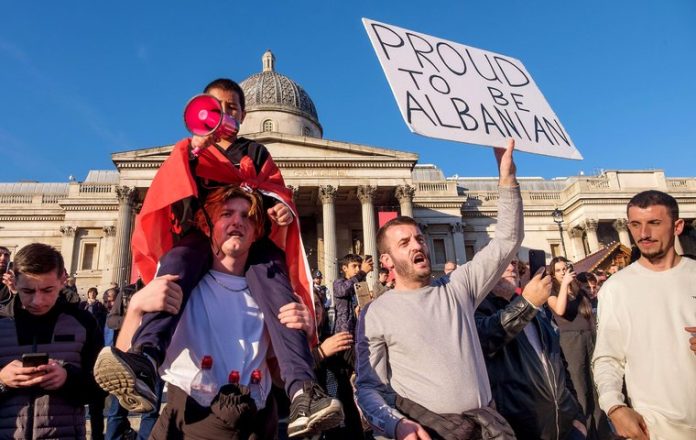Back in 2018, Albania’s Prime Minister Edi Rama stated that his country would never allow European Union refugee camps to be built on its territory, suggesting that the idea would turn the country into a “breakwater for Europe’s refugees,” Social Europe reported.
However, five years later, the Prime Minister abruptly changed his mind: Albania will now become the first non-EU country to deal with people clustering at its borders on behalf of an EU member state.
Albania’s prime minister signed an agreement with his Italian counterpart Giorgia Meloni on 6 November that would allow Italy to send up to 36,000 of those it rescued in the Mediterranean to centres on Albania’s northwest coast.
Women, children and individuals deemed “vulnerable” will be exempted and treated in Italy. Male-only establishments in Albania would be under Italian jurisdiction and fully funded by Rome.
The Albanian port city of Shengjin will house a reception and screening centre, and a detention centre will be built on an abandoned military base in Gjader.
The announcement sparked protests in various circles in Albania and Italy. Two Italian politicians compared the planned centres to Guantánamo Bay in Cuba, where the United States holds suspected Islamist “terrorists” indefinitely after “9/11.”
Critics argue that the plan would allow Italy to bypass the EU’s Dublin Regulation, which determines the member state responsible for examining an application for international protection. Under the convention, the first country an asylum seeker arrives in is responsible for examining the asylum seeker’s case.
However, the plan raised other concerns: the segregation of adult men could amount to the separation of families.
The UK was planning a similar proposal to deport “illegal” asylum seekers, crossing the Channel to the UK in small boats, to Rwanda for processing and possible resettlement.
But the UK Supreme Court ruled the Rwanda scheme was unlawful on November 15. The court unanimously ruled that asylum seekers sent to Rwanda would be “at real risk of ill treatment,” if deported to the homeland from which they had fled.
In response, there has been intense debate about the UK potentially withdrawing from the European Convention on Human Rights, to which all 46 members of the Council of Europe are signatories. The Supreme Court, however, called to its aid the numerous international treaties ratified by the UK, as well as the domestic laws that give them effect.
These plans for Rwanda and Albania are based on the idea that offshore salvage and processing will deter those thinking of crossing the Mediterranean and the Channel. Some experts argue the opposite: Australia’s opening of offshore processing centres in 2012 was followed by a marked increase in illegal crossings.
Albania’s plan has also been criticised for its lack of transparency. There was no public discussion or political consultation prior to Rama-Meloni’s announcement. Rama is believed to have agreed to the porting scheme after hosting Meloni in Albania in mid-August.
Giorgia had talked to me about this before the summer; then we talked on August 15th when she came to Albania. We have had other requests from different countries, but we could not say no to Italy.
About 17 years ago, Albania took in former Guantanamo prisoners. More recently, as the US withdrew from Afghanistan and the Taliban regained power, Albania took in hundreds of Afghan refugees. Most of them were transferred to Shengjin, the site of a planned Italian reception and screening centre.
Balkan states such as Albania are still seen by the EU as “other” and backward. The EU takes away the best and most talented young people and their cheap labour. This leaves corrupt, poor states headed by compromised and therefore easily manipulated leaders willing to do anything to enhance their power and prestige on the world stage.
Brussels thus benefits from keeping EU candidate countries such as Albania, North Macedonia and Serbia outside the union, where they can be used as migrant depots and labour plantations, while EU asylum and labour laws do not apply.
As European commissioner for home affairs, Ylva Johansson, said last week, “EU law is not applicable outside EU territory.”
